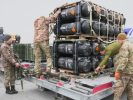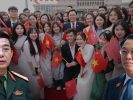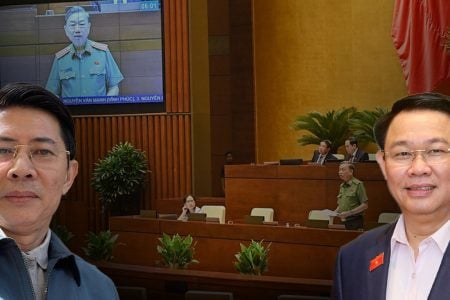
US Vice President Kamala Harris is expected to visit Vietnam on August 24-26, after visiting Singapore starting on August 22.
Her visit comes just days after the once US-backed government in Afghanistan collapsed following Taliban attacks, raising questions about the US role and credibility.
However, according to Susan Sutton, former Deputy US Ambassador to Vietnam from 2015-2017, when observing US foreign policy, it is necessary to take a long-term view.
The former deputy ambassador said in an interview with VOA that the policy focuses on the future in Asia, where Vietnam is a very important player. Former US Deputy Ambassador Susan Sutton also affirmed that the South China Sea (Vietnam calls it the East Sea) is different from Afghanistan.
Below are the details.
VOA: The Office of the Vice President of the United States says your visit to Singapore and Vietnam is a further development from the “America Pivot” policy. How important is Vietnam in this policy?
Ms. Susan Sutton: It is great that the Vice President of the United States visits Singapore and Vietnam because those are two important partners. We have seen developments since the last administration, and from the US rebalancing to Asia, with the realization of how important Asia is to the US in formulating a foreign policy that helps the US safer, more prosperous, and hopefully also safer and more prosperous Asian countries.
For a long time, the US focused on counter-terrorism, focusing on the Middle East, the Gulf. It’s been a tense period for America, for the world until we see some of the results and consequences of that policy.
But we need to look to the long term. What was true when the United States announced its rebalancing policy is still true now. Asia is truly the future and America needs to engage with countries to help us build a better future.
Vietnam, when I talk to Vietnamese people, they often say Vietnam is a small country. But obviously Vietnam is not a small country. Vietnam has more than 90 million people, Vietnam is bigger than Germany. And continuously in recent years, Vietnam has the fastest economic growth in the world. Of course, the COVID pandemic has rattled the statistics, but the fundamentals of Vietnam’s development continue to exist. It’s a dynamic workforce and a wealth-oriented country.
Therefore, I think that developing relations with Vietnam is really important so that we have a good mechanism to resolve disagreements and continue to expand areas of cooperation.
We sometimes forget that Vietnam-US relations are quite new. Over the course of our lives, we often take that kind of bilateral relationship for granted. But in fact, we are still constantly opening new areas in our relationship: new cooperation, the US invests more in Vietnam, trade increases, looking for more areas of common interest. Not every country has such a relationship. Many countries have developed relations to the fullest extent, things continue as they were in the past. But with Vietnam, we are constantly looking for new opportunities.
Therefore, Vice President Kamala Harris’s visit is very important, and at the same time, it is essential that we continue to recognize that Vietnam is an important element in our development of relations with the region.
VOA: Harris’s office also said that her visit was meant to emphasize the importance of comprehensive relationships and strategic partnerships. So is it possible that the female vice president of the US and the leader of Vietnam announced to upgrade the relationship to a strategic partnership?
Susan Sutton: I hope so. That would be a great step from both sides.
On the US side, we do not have a relationship hierarchy according to the levels of strategic partnership or comprehensive partnership like that of Vietnam or some countries. So the importance of this is probably not so much for the US than it means for Vietnam.
I think Vietnam has been interested in this issue for a long time and would like to find an appropriate occasion because it is an announcement related to a high-level visit. Whether they decide to make a statement during this visit, or whether they wait a while and announce on the next high-level visit is not so important. For my part, I definitely want to cheer for both sides to take that step now.
As I said, from an American point of view, this doesn’t make much sense. We consider Vietnam a really important partner and we don’t need another adjective.

But in my experience, in Vietnam, people really want to increase cooperation with the US, from the defense ministry, from the provinces, from the schools, from almost anywhere. However, they are always cautious, not moving too fast compared to national policy. Therefore, the announcement of the upgrade to a strategic partnership will send an important signal to all Vietnamese officials in the provinces and businesses that “Yes, the government’s policy supports increasing and deepening cooperation with the United States.”
For that reason, in my opinion, Vietnam’s move to upgrade relations is entirely in the interest of Vietnam, and thereby opens doors to serve the interests of both countries.
VOA: The world has just witnessed the US withdrawal from Afghanistan and the collapse of the government, the Taliban entered Kabul. How does this affect the way Vietnam looks at U.S. involvement in the South China Sea? What does Vice President Harris need to do to reassure Vietnam and other countries in the region?
Susan Sutton: These are sad and difficult times. I certainly understand the questions raised by the American press and partners.
But in a very practical way, the important thing is, and I think Vietnamese officials understand very well, that America’s interest in security and respect for the rule of law in the South China Sea is not out of altruism, no not because it affects other countries, but because we have a great interest in safeguarding security and freedom of navigation in the South China Sea and around the world.
So to speak, the argument for involvement in Afghanistan is an argument for our concern for the Afghan people. But the argument about active US activity in the South China Sea to protect security and freedom of navigation is in the nature of our security interests. Everyone should recognize that the US will be active and committed to devoting resources to protecting our interests.
VOA: At this time, when the US wants to win Vietnam’s support in its competition with China, do you think Vice President Harris will speak “softly” to Vietnam about human rights?
Ms. Susan Sutton: The dialogue between the two countries on human rights in recent years has been very sincere. I wouldn’t describe it as “strong” or “mild” but I would describe it as very sincere, and I expect this to continue.
We have often made it clear to our government-level partners on the Vietnamese side that the human rights issue is not about the US trying to tell Vietnam to do something.
Vietnam is a member of the United Nations, a signatory to many international conventions, including the Covenant on Civil and Political Rights and recently ratified the ILO Convention on the Collective Labor Agreement. These are international commitments, and we all monitor each other for accountability for those commitments.
Other countries criticize the US all day long, and if they believe that the US is not living up to its international commitments, they have every right to criticize.
So it’s a dialogue about all of us staying true to the international commitments we’re in. The United States has such dialogues with many countries, and we need to continue to have dialogue with Vietnam in a sincere and fair manner.
We recognize Vietnam has made important strides in recent years and we welcome it. But there are many areas where people’s human rights have not been properly protected.
I can say that making progress in Vietnam will sometimes go forward, sometimes back, sometimes backward. This also happens in many other countries. We have to recognize this and look beyond, after 10 years, 20 years, I think we have to say that there is progress after a long time.
I am confident that Vice President Harris will raise the issue of human rights in the same spirit that we, as diplomats, apply to it: We are friends, we have disagreements. There’s a lot going on and we need to talk about that. Because, as you can see, the American people here want democracy, and ultimately American foreign policy is determined by the will of the American people. The American people really want us to have the closest friendship, the closest cooperation with countries that do not infringe the rights of citizens in those countries.
Thoibao.de (Translated)



























